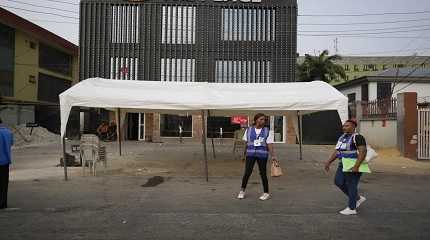
ABUJA, Nigeria (AP) — Voters in Nigeria cast ballots Saturday to choose a new president as Africa’s most populous nation struggles with a bank note shortage that some observers fear will result in a lower than expected turnout.
The presidential and parliamentary elections come amid fears of violence, from Islamic militants in the north to separatists in the south, though officials stressed that this year’s vote would not be postponed as the last two presidential elections were.
Voting started late in some states Saturday where electoral officials did not arrive in time to verify the identity of voters before they could cast their ballots.
Out of the field of 18 presidential candidates, three front-runners have emerged in recent weeks: the ruling party candidate, the main opposition party candidate and a third party challenger who has drawn strong support from younger voters grappling with a 33% unemployment rate.
But whether those supporters would show up in force at the polling stations remained unclear as Nigerians have waited hours in line at banks across the country this past week in search of money.
In Abuja, Favour Ben said it has been a smooth process so far in her voting unit in Kubwa area where she arrived more than an hour before voting was scheduled to start.
“Obi knows what Nigerians need,” the 29-year-old said, referring to third-party candidate Peter Obi. “He knows what is actually disturbing us and I believe he knows how to tackle it.”
The vote is being carefully watched as Nigeria is Africa’s largest economy and one of the continent’s top oil producers. By 2050, the U.N. estimates that Nigeria will tie with the United States as the third most populous nation in the world after India and China.
It is also home to one of the largest youth populations in the world: About 64 million of its 210 million people are between the ages of 18 and 35, with a median age of only 18.
Incumbent President Muhammadu Buhari’s tenure was marked by concerns about his ailing health and frequent trips abroad for medical treatment. Two of the top candidates are in their 70s and both have been in Nigerian politics since 1999.
By contrast, at 61, Obi of the Labour party is the youngest of the front-runners and had surged in the polls in the weeks leading up to Saturday’s vote.
Still, Bola Tinubu has the strong support of the ruling All Progressives Congress party as an important backer of the incumbent president. And Atiku Abubakar has the name recognition of being one of Nigeria’s richest businessmen, having also served as a vice president and presidential hopeful in 2019 for his Peoples Democratic Party.
The full impact of Nigeria’s currency crisis on Saturday’s election was not immediately clear, though officials said they’d been able to get much of the money the government needed to carry out the vote. In Lagos, a policewoman who was in a bank queue to withdraw cash told The Associated Press on Thursday she has not been able to go where she was deployed for election duty because she could not get cash.
After officials in November announced the decision to redesign Nigeria’s currency, the naira, new bills have been slow to circulate. At the same time, older bank notes stopped being accepted, creating a shortage in a country where many use cash for daily transactions.




